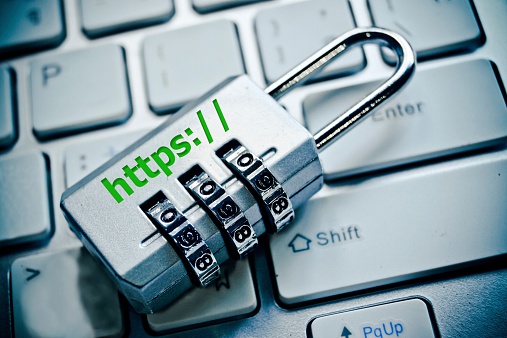Table of Contents
Are you curious about how to make your website secure? Are you not sure where to start or what steps to take? This ultimate guide will provide you with all the information you need to know to make your website safe.
It is essential to be proactive about website security, as hackers are always looking for new ways to exploit vulnerabilities. So, read on and learn how you can protect your website and your users.
1. Install SSL Certificate
One of the most important steps you can take to make your website secure is to install an SSL or Secure Sockets Layer. This encryption protocol ensures that all data transferred between a user’s computer and your website is encrypted and protected from malicious actors.
Also, the HTTPs (Hypertext Transfer Protocol Secure) version helps to protect sensitive information like login credentials and credit card numbers from hackers. You can purchase an SSL certificate from various providers, or if you’re using WordPress, you can use Really Simple SSL plugin to handle the installation for you and make your site secure.
In addition to a free SSL Certificate, you should also install a web application firewall on your business website. This will help protect against malicious traffic and keep hackers from accessing your site.
2. Use Anti-Malware Software
Another critical step in securing your website is to invest in quality anti-malware software. Viruses, malware, spyware, and other malicious attacks can wreak havoc on a website – stealing data, corrupting files, and even taking over entire sites by infecting WordPress plugins or themes.
There are many different types of anti-malware software out there that can help protect your site against these threats. Some offer real-time scanning to detect vulnerabilities as soon as they happen. Others can scan for threats and remove them automatically. And some even provide auto file backup features so you can restore corrupted or compromised files with ease.
Which WordPress Security Plugins Can You Try?
You can consider the following plugins for a secure website:
- Wordfence Security: It is one of the most popular and trusted WordPress security plugins. It lets you set up login security, firewall protection, malware scan, etc.
- Sucuri Security: This plugin has real-time website monitoring, post-hack actions, virtual patching, blacklist removal, etc.
- iThemes Security: With this plugin, you can protect your website against brute force attacks, spam comments, and other common threats to WordPress sites. It also offers two-factor authentication, strong password enforcement, 404 detections, etc.
- All in One WP Security And Firewall: As the name suggests, this plugin helps you address all the critical aspects of website security, such as file permission security checks, user controls, database security, etc.
- BulletProof Security: This plugin gives you complete control over your website’s security with features like login lockdown, firewall for WordPress Core files, auto-restore of any file changed by malware or by hackers, etc.
3. Make Your Passwords Uncrackable
Your passwords are your first line of defense against hackers. That’s why it’s essential to make them as strong and as difficult to crack as possible.
The best passwords are at least 12 characters long and include a mix of uppercase and lowercase letters, numbers, and symbols. They should also be unique for each account (i.e., you shouldn’t use the same password for your email as you do for your banking).
One way to create and remember strong passwords is to use a passphrase – a series of unrelated words that you can easily remember, but that would be difficult for someone else to guess. For example, “my favorite color is blue” or “I love spending time with my family.”
4. Keep Your Website Up to Date
It’s essential to always keep your website up to date, both software and security. New versions of WordPress or other plugins and themes are often released for bug fixes or added functionality and can help protect your site against threats.
Similarly, keeping your site’s security patches and settings up to date can help prevent brute-force attacks, phishing attempts, and other intrusions. This may mean disabling certain features that aren’t frequently used, removing unused plugins and themes, or updating server configurations.
5. Select The Right Content Management Systems And Web Hosting provider
The content management system (CMS) and web hosting company you choose are essential when securing your website. WordPress is one of the most popular CMS options available, and while it’s fairly secure out of the box, there are still some steps you need to take to ensure its safety.
For example, only install plugins and themes from reputable sources. Avoid nulled or pirated copies as they may contain malware or other malicious code. And always delete any unused themes or plugins from your site.
6. Manually Accept On-Site Comments
Allowing comments on your website can be a great way to encourage engagement and build rapport with your audience. However, it also opens up the possibility for spam comments and other malicious content.
One way to combat this is to approve all comments before they’re published manually. This way, you can ensure that only relevant and high-quality comments are displayed on your site.
7. Run Regular Backups
No matter how secure your website is, there’s always a chance something could go wrong. That’s why it’s essential to run regular backups of your site so you can restore it in the event of an attack or other data loss.
There are many different ways to backup your website, but one of the simplest and most effective is to use a WordPress plugin. It will create a complete backup of your site (files, database, and plugins) and store it safely off-site.
8. Monitor Your Traffic for Suspicious Activity
It is crucial to monitor your website traffic for any suspicious activity. This can help you identify any potential threats and take appropriate actions. You can use various tools to help you with this, such as Google Analytics or any web security monitoring service.
FAQs
1. How Do Websites Get Hacked?
There are many ways that websites can get hacked. The most common way is through insecure coding practices and vulnerabilities in the website code itself. Other ways include SQL injection, cross-site scripting, and phishing attacks.
Insecure coding practices are often the root cause of website hacks. Poorly written code can leave gaps that hackers can exploit to gain access to the website. Once they have access, they can do anything from stealing sensitive data to planting malware on the web address.
2. How To Install An SSL Certificate?
To install SSL certificates, you will need to purchase one from a trusted SSL provider and follow their instructions to set it up on your website. Installing the certificate may involve uploading files, editing configuration files, or changing your web server settings. You can also use a free WordPress website plugin.
3. Why Is Cybersecurity Important?
Cybersecurity is critical because it helps protect your website from hackers and cybercriminals. It can also help you avoid data breaches, leading to the loss of sensitive data or damage to your reputation. So, prevent security vulnerabilities to deal with security issues.
4. What Is Two-Factor Authentication?
Two-factor authentication (2FA) is an additional layer of security that requires users to provide two pieces of information to log in to a website or online account. The most common type of 2FA is using a password and a one-time code sent to your cellphone via SMS.
Conclusion
While website security should be taken seriously by all business owners, it doesn’t have to be a daunting task. These eight quick steps will help you make your website more secure and give you peace of mind knowing that your customers’ data is safe. Have you made your website more secure using these tips?

Want more SEO traffic?
Discovering the secret to increasing your website’s traffic could be as simple as accessing this Free SEO analyzer tool!
Try it - it's free







